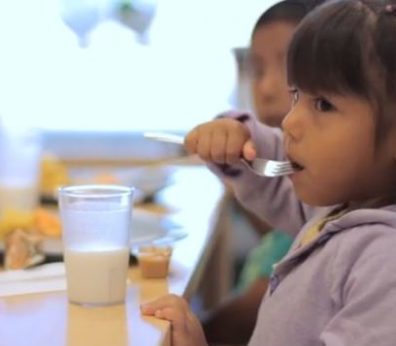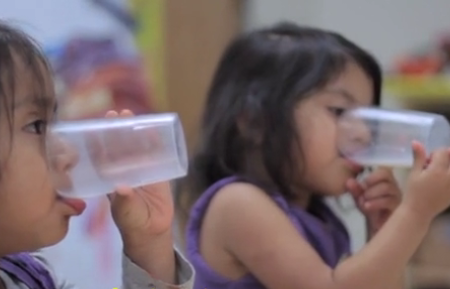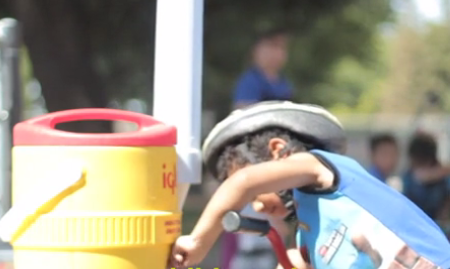
Share On Social!
Research shows that children who consume too many sugary drinks risk developing diseases related to unhealthy weight. Latino children, because they tend to consume more sugary drinks than their peers, are at an even higher risk. Health leaders, school officials, and parents in one Latino community in California worked to create a policy to bump sugary drinks out of early-childcare centers and help kids fall in love with water at a young age.
EMERGENCE
Awareness: More than 44% of children overall in Madera County, Calif., are overweight or obese, and Latino children have even higher rates. Public health groups across California are recognizing these issues and working to reduce them. CA4Health, directed by the Public Health Institute (PHI) in California, is a statewide healthy-living grant from the Centers for Disease Control and Prevention covering rural and small California counties. Madera County, which is about 54% Hispanic, is one of the CA4Health counties.
One of CA4Health’s 4 strategic directions is reducing consumption of sugary drinks. They were looking for an opportunity to make lasting changes in children’s drinking habits.
Learn: As a part of CA4Health, Madera County Public Health Department (Madera Public Health) began researching the health effects of sugary drinks on children.
“When it comes to the prevention of overweight and obesity, one of the critical stages is infancy,” said Jose Arrezola of Madera Public Health. He cites Dr. Robert Lustig, a prominent sugar researcher, who cites increased sugar consumption as the main cause of unhealthy weight gain in children.
Committed to tackling the sugary drink issue, Madera Public Health officials decided Head Start centers would be a great place to reach young kids. Head Start is a federal program that helps children (from birth to age 5) from low-income families get ready for school and beyond. Madera County Head Start reaches more than 1,500 children a year.
Frame Issue: “We chose Head Start because…they serve the youngest individuals that we have,” said Amelia Peterson-Nichols of Madera Public Health. The centers in Madera County also serve the lowest-income children in the region, which includes children of regional and migrant farm workers.
The earlier kids become use to receiving water instead of sugary drinks, the better, said Peterson-Nichols.
The coalition didn’t just want to remove sugary drinks; they wanted to be sure to make water became readily available in its place, explained Cyndi Walter of PHI. This two-fold mission is at the heart of the healthy beverage initiative.
DEVELOPMENT

Source: http://www.phi.org/news-events/530/head-start-brings-healthy-beverages-to-madera-county-kids
Education/Mobilization: Any new beverage policy would need the approval of the Community Action Partnership of Madera County (CAPMC), because they oversee the local Head Start centers. When the health department and PHI brought the idea to Mattie Mendez, the executive director at CAPMC, she was very supportive, Arrezola said.
During initial planning meetings between Madera Public Health, Mendez, and Maritza Gomez, the Head Start Program Director, they decided that the first step was to educate Head Start parents.
The parents at each of the centers are very involved, and Head Start supports their growth as advocates, leaders, and educators in their communities, Arrezola said.
“We actually could not even see this being possible without the parents,” Peterson-Nichols said.
Arrezola gave several English and Spanish presentations between May 2012 and May 2013 to parents of Head Start students, teaching them how sugary drinks could be harmful to the health of young children and how easy it is to replace them with healthier options, such as water. Many of the parents said they didn’t realize their kids were consuming so much sugar from their drinks.
Parents agreed that it was time to make some changes for the health of their children, and they supported the new Head Start beverage policy, Arrezola said.
Debate: With parental support, Madera County Head Start center officials met with dieticians and reviewed their menus.
“We identified that we were providing sugary beverages, such as juice, to our infants and toddlers,” Mendez said.
Everyone agreed that writing healthy beverages into a policy would have the most lasting effect.
Arrezola said he was confident that Head Start parents wanted their kids to be healthy. “With this in mind, we strategized to create a policy solution that could make all children healthier, while educating and creating a behavior change in parents,” he said. Making a policy change seemed like the obvious choice to the group, especially since the adoption and implementation of the policy links-up with existing local and state healthy living campaigns, such as the HEAL Zone and Rethink Your Drink campaign.
In line with the two-fold mission, they wanted the policy to not only limit sugary drinks, but promote water consumption.
“We want it written somewhere, that there will be increased access to water,” Walter said.
But how exactly was water going to be available?
“We had to figure out how they were going to access free and safe water,” Peterson-Nichols said.
They decided that buying low-cost coolers, filing them with water, and placing them around playgrounds and in classrooms would ensure that a refreshing cup of water was always close by.
ENACTMENT
Activation: The group decided that it was important to educate the Head Start staff who would be implementing the policy just as they had done with the parents. So presentations were made to CAPMC and Head Start center staff.
The Head Start centers continued spreading word about the new policy to various community organizations.
“We mentioned this policy work at schools, at First 5 (a California-based resource center for ages 0-5) locations, churches, [federal health] clinics, and some other government organizations,” Arrezola said.
Frame Policy: Back in 2011, Walter and her team at PHI pulled together nutrition experts from the University of California, various professionals at PHI, people from the California Public Health Department, and others who had done sugary drink research to craft some healthy beverage guidelines.
When crafting the new beverage guidelines for Madera Head Start centers, the team followed PHI’s 2011 guidelines. In fact, back when PHI was working on the 2011 guidelines, it was Madera County that expressed interest in having specific guidelines for children ages 0-5.
“We didn’t have [guidelines for] 0-5 until Madera indicated to us they were looking to work there,” Walter said.
Change: After the Head Start Health Advisory Committee, the Parent Policy Council, CAPMC administrative staff, and Head Start program administrative staff reviewed the proposed new beverage standards, the standards were adopted by CAPMC on February 21, 2013. Now all Head Start sites in Madera County must provide the following age-specific standards:
0-12 Months:
• Breast milk (best option)
• Baby formula with iron
• No juice is served at any time
12-23 Months:
• Unflavored whole cow’s milk with no added sweeteners
• Water with no additives, including vitamins, minerals (e.g. electrolytes), stimulants (e.g., caffeine) and sweeteners
• No juice is served at any time
2-5 years of age:
• Unflavored non-fat or 1% cow’s milk with no added sweeteners
• Water with no additives, including vitamins, minerals (e.g. electrolytes), stimulants (e.g., caffeine) and sweeteners
• 100% juice limited to no more than two meals per month
IMPLEMENTATION

Source: http://www.phi.org/news-events/530/head-start-brings-healthy-beverages-to-madera-county-kids
Implementation: The new policy went into effect Sept. 1, 2013. Now, when the kids are outside playing, big coolers of cold water are close by.
Arrezola and Peterson-Nichols say parents approve of the changes.
“Some parents have also reported that it is easier to only serve water and white milk in their house, because that became the norm with their children,” Arrezola said.
Floridelia Romero, who has a daughter in a local Head Start center, is truly excited about how the changes are affecting her daughter.
“I know that since she is starting at a young age, as an adult she won’t be drinking that much sugar and she will get used to living a healthier lifestyle,” Romero said.
Equity: The policy requires Head Start staff to monitor the implementation of the policy. Existing and new staff are trained on nutrition services, said Arrezola. He also said that he will continue to give his sugary drinks presentation to parent groups who want to continue to learn.
CAPMC will continue to regularly monitor the centers and compliance with the new beverage standards. Conversations have begun about evaluating the new standards by tracking body mass index (BMI) and cost-benefit analysis, comparing data from before and after the standards went into place.
Sustainability: The policy hasn’t just changed Heat Start centers, but families’ home habits, too.
According to Arrezola, one Head Start parent approached the agency requesting water pitchers to encourage drinking more water in his house. His idea: place a pitcher filled with water in the middle of the table during family meals.
Easy, affordable steps likes this, the Madera County health officials say, are why parents feel empowered to make healthy choices for their kids.
And it’s all because of the policy change.
“It doesn’t matter tomorrow who’s here and who’s not, the fact is that the systems have been changed for the better and that change will be sustainable,” said Van Do-Reynoso, director of Madera County Public Health. “Children’s lives have been impacted and our community will be healthier.”
This success story was produced by Salud America! with support from the Robert Wood Johnson Foundation.
The stories are intended for educational and informative purposes. References to specific policymakers, individuals, schools, policies, or companies have been included solely to advance these purposes and do not constitute an endorsement, sponsorship, or recommendation. Stories are based on and told by real community members and are the opinions and views of the individuals whose stories are told. Organization and activities described were not supported by Salud America! or the Robert Wood Johnson Foundation and do not necessarily represent the views of Salud America! or the Robert Wood Johnson Foundation.
ABOUT THE PROGRAM
Salud America! The RWJF Research Network to Prevent Obesity Among Latino Children is a national program of the Robert Wood Johnson Foundation. The program aims to educate researchers, decision-makers, community leaders, and the public in contributing toward healthier Latino communities and seeking environmental and policy solutions to the epidemic of Latino childhood obesity. The network is directed by the Institute for Health Promotion Research at the University of Texas Health Science Center at San Antonio.
For more information, visit http://www.salud-america.org.
By The Numbers
74
percent
of Latino kids have had a sugary drink by age 2 (vs. 45% of white kids)
This success story was produced by Salud America! with support from the Robert Wood Johnson Foundation.
The stories are intended for educational and informative purposes. References to specific policymakers, individuals, schools, policies, or companies have been included solely to advance these purposes and do not constitute an endorsement, sponsorship, or recommendation. Stories are based on and told by real community members and are the opinions and views of the individuals whose stories are told. Organization and activities described were not supported by Salud America! or the Robert Wood Johnson Foundation and do not necessarily represent the views of Salud America! or the Robert Wood Johnson Foundation.



